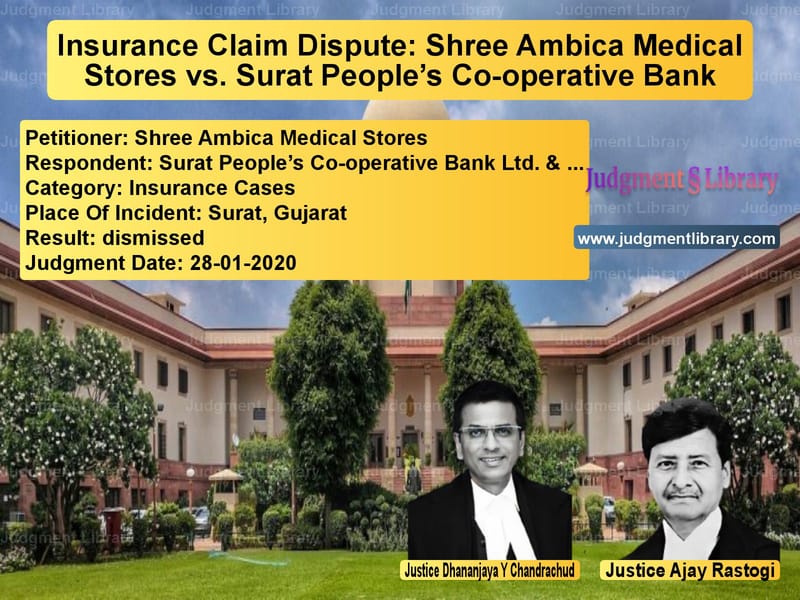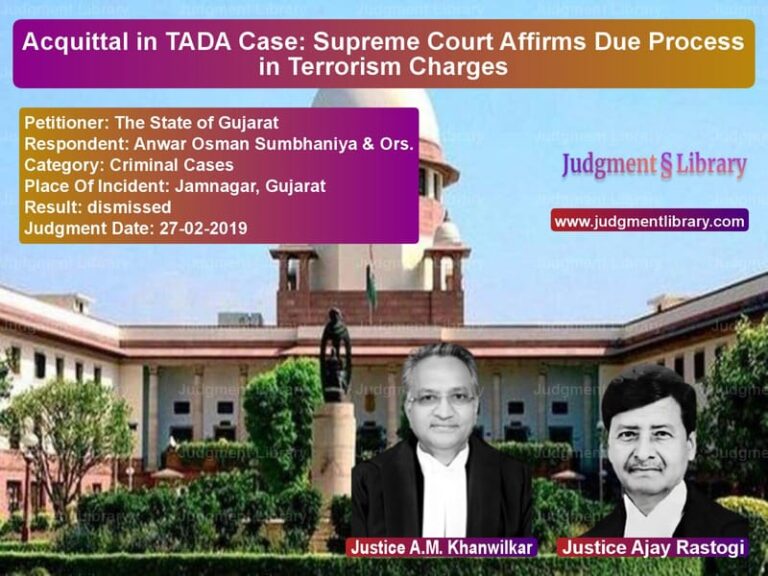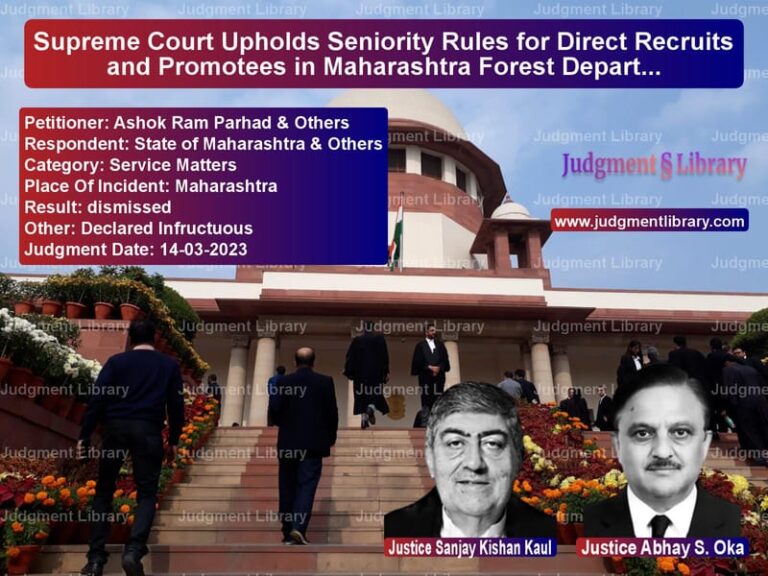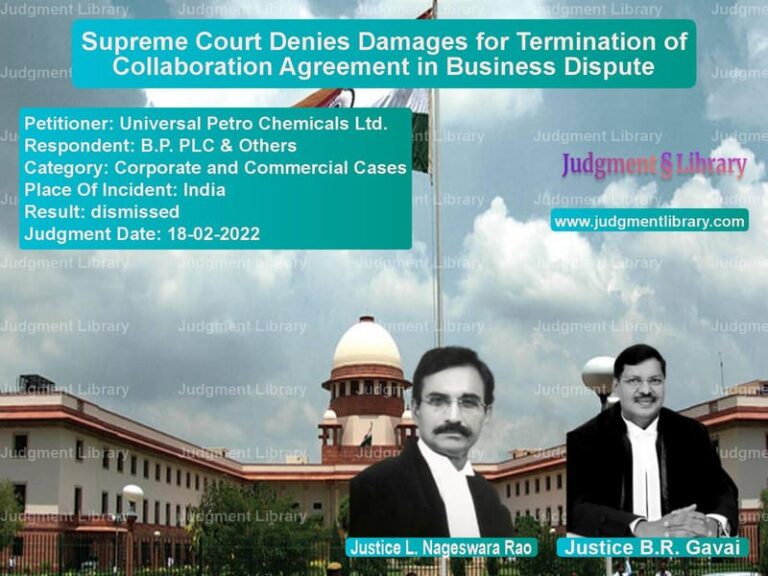Insurance Claim Dispute: Shree Ambica Medical Stores vs. Surat People’s Co-operative Bank
The case of Shree Ambica Medical Stores vs. Surat People’s Co-operative Bank revolves around a dispute over an insurance claim for goods lost due to floods. The key legal questions pertained to whether the insurance company had rightfully excluded certain perils from coverage and whether the bank was responsible for ensuring proper insurance coverage for its borrowers. The Supreme Court was called upon to determine liability among the bank, the insurer, and the insured borrower.
Background of the Case
Shree Ambica Medical Stores had obtained a cash credit facility from Surat People’s Co-operative Bank. Under the loan agreement, the borrower was required to insure the hypothecated goods against fire and other risks. If the borrower failed to do so, the bank had the right to arrange for insurance and recover the costs.
The bank, acting as a corporate agent of New India Assurance Company Ltd., secured insurance policies covering the borrower’s goods. Initially, the policies covered fire, storm, tornado, flood, and inundation (STFI) perils. However, in the 2005-06 policy renewal, the insurer excluded STFI perils, and the premium for this coverage was refunded.
On August 7, 2006, Surat experienced severe flooding, resulting in damage to the borrower’s goods. The borrower filed a claim for ₹78,66,857. While the insurer approved ₹23 lakhs under a separate policy, it rejected the claim under the ₹60 lakh policy, citing the exclusion of STFI perils.
Arguments of the Appellant (Shree Ambica Medical Stores)
The borrower contended that:
- The exclusion of STFI perils was wrongful, as the policy was a renewal and should have retained all prior coverage.
- The bank, acting as a corporate agent of the insurer, failed to ensure comprehensive coverage.
- The insurer had a duty to inform the borrower about the exclusion of STFI perils.
- The bank and the insurer had engaged in unfair trade practices by modifying the policy without the borrower’s knowledge.
Arguments of the Respondents (Bank and Insurer)
The bank and insurer countered that:
- The borrower was responsible for reviewing the policy terms and had received a copy of the policy, which clearly excluded STFI perils.
- The insurer refunded the STFI premium amount of ₹992, which was credited to the borrower’s account, indicating the change in coverage.
- The policy in question was a new contract, not a renewal, as it covered a different location from previous policies.
- The insurer had a commercial right to exclude certain perils at its discretion.
Key Observations of the Supreme Court
The Supreme Court analyzed the case based on the following factors:
- Whether the exclusion of STFI perils was legally justified.
- Whether the bank was liable for failing to secure appropriate coverage.
- Whether the insurer had a duty to inform the borrower explicitly.
The Court found that:
- The policy for 2005-06 was a new contract as it covered a different business location than previous policies.
- The insurer had clearly excluded STFI perils in the policy document, and the borrower had received a copy.
- The refund of ₹992 indicated the exclusion of STFI perils, and the borrower had failed to question it at the time.
- The borrower could have obtained additional coverage separately but did not do so.
Verbatim Court Findings
The Supreme Court observed:
“The terms of the policy will govern the contract between the parties. The STFI risks were specifically excluded from the coverage of the policy. The extra premium of ₹992 was refunded by the insurer to the bank, and the bank deposited the amount in the insured’s account.”
Additionally, the Court held:
“Nothing prevented the appellants from either approaching the insurer or any other insurance company for obtaining a policy that covered STFI perils.”
Final Judgment
The Supreme Court upheld the decision of the National Consumer Disputes Redressal Commission and ruled that:
- The insurer was not liable for the loss, as STFI perils were explicitly excluded.
- The borrower had an obligation to review the policy terms.
- The bank was not responsible for the exclusion, as it had correctly facilitated the insurance process.
Final Verdict: Appeal dismissed.
Petitioner Name: Shree Ambica Medical Stores.Respondent Name: Surat People’s Co-operative Bank Ltd. & Ors..Judgment By: Justice Dhananjaya Y Chandrachud, Justice Ajay Rastogi.Place Of Incident: Surat, Gujarat.Judgment Date: 28-01-2020.
Don’t miss out on the full details! Download the complete judgment in PDF format below and gain valuable insights instantly!
Download Judgment: Shree Ambica Medical vs Surat People’s Co-op Supreme Court of India Judgment Dated 28-01-2020.pdf
Direct Downlaod Judgment: Direct downlaod this Judgment
See all petitions in Commercial Insurance Disputes
See all petitions in Insurance Settlements
See all petitions in Other Insurance Cases
See all petitions in Judgment by Dhananjaya Y Chandrachud
See all petitions in Judgment by Ajay Rastogi
See all petitions in dismissed
See all petitions in supreme court of India judgments January 2020
See all petitions in 2020 judgments
See all posts in Insurance Cases Category
See all allowed petitions in Insurance Cases Category
See all Dismissed petitions in Insurance Cases Category
See all partially allowed petitions in Insurance Cases Category







